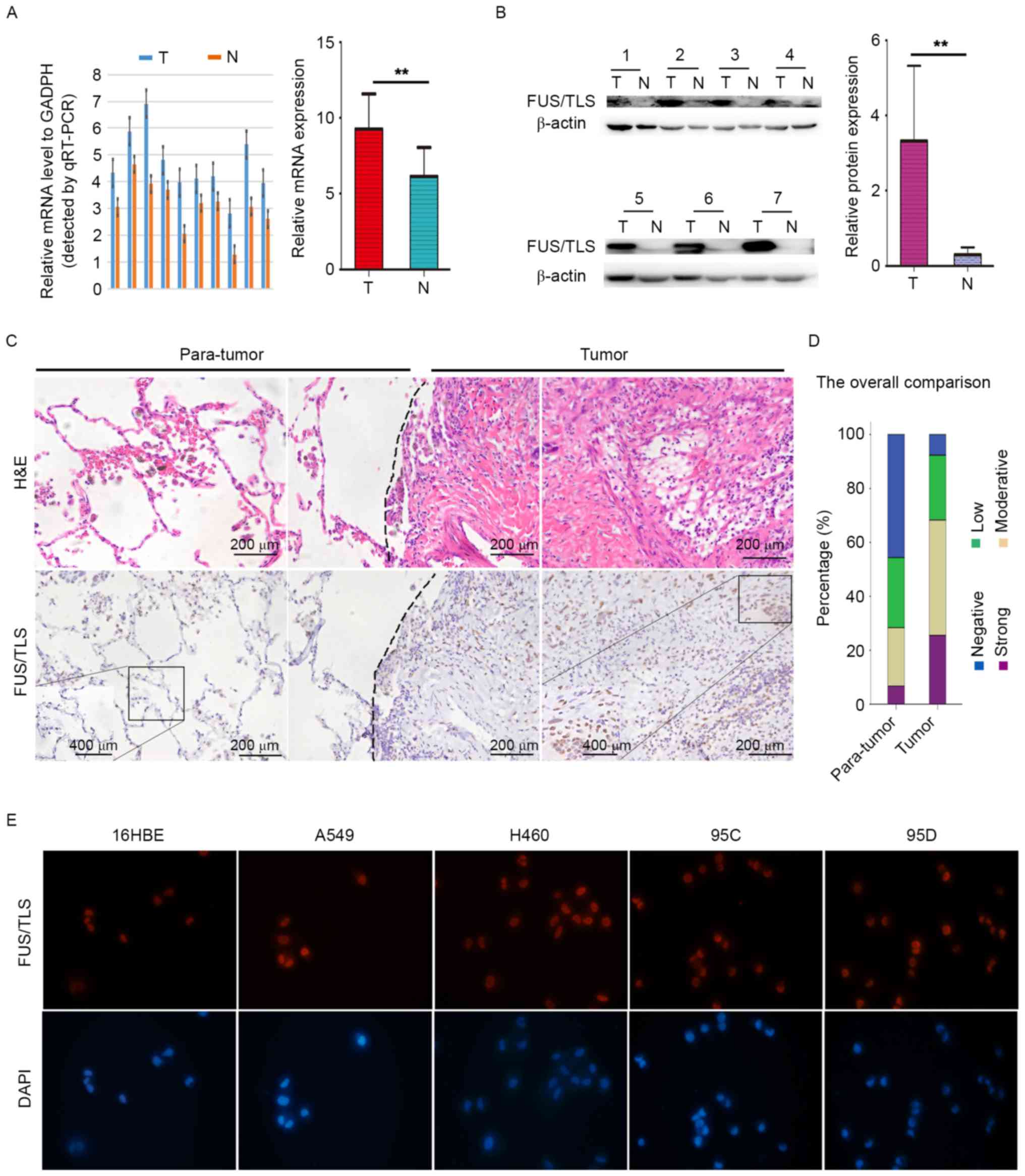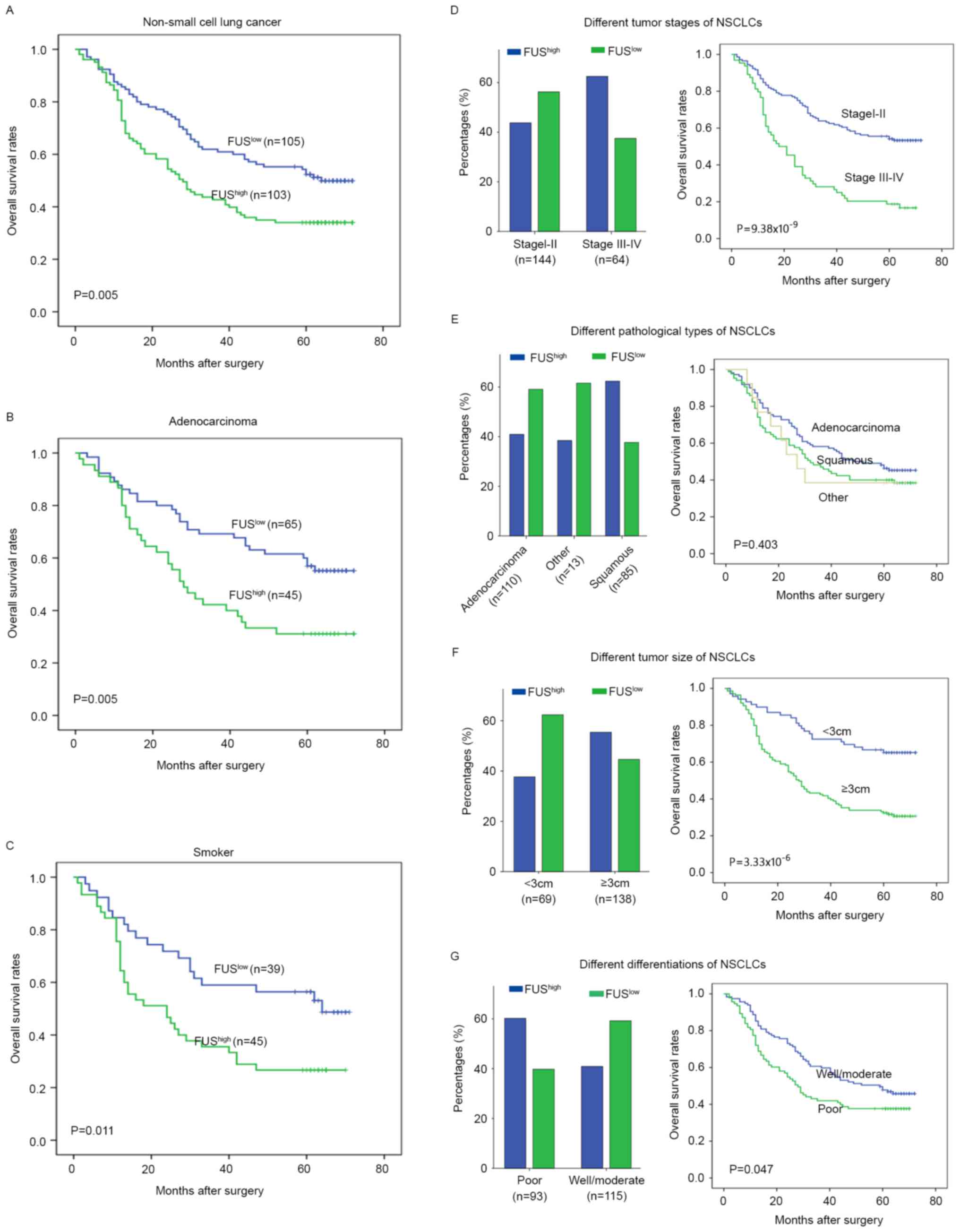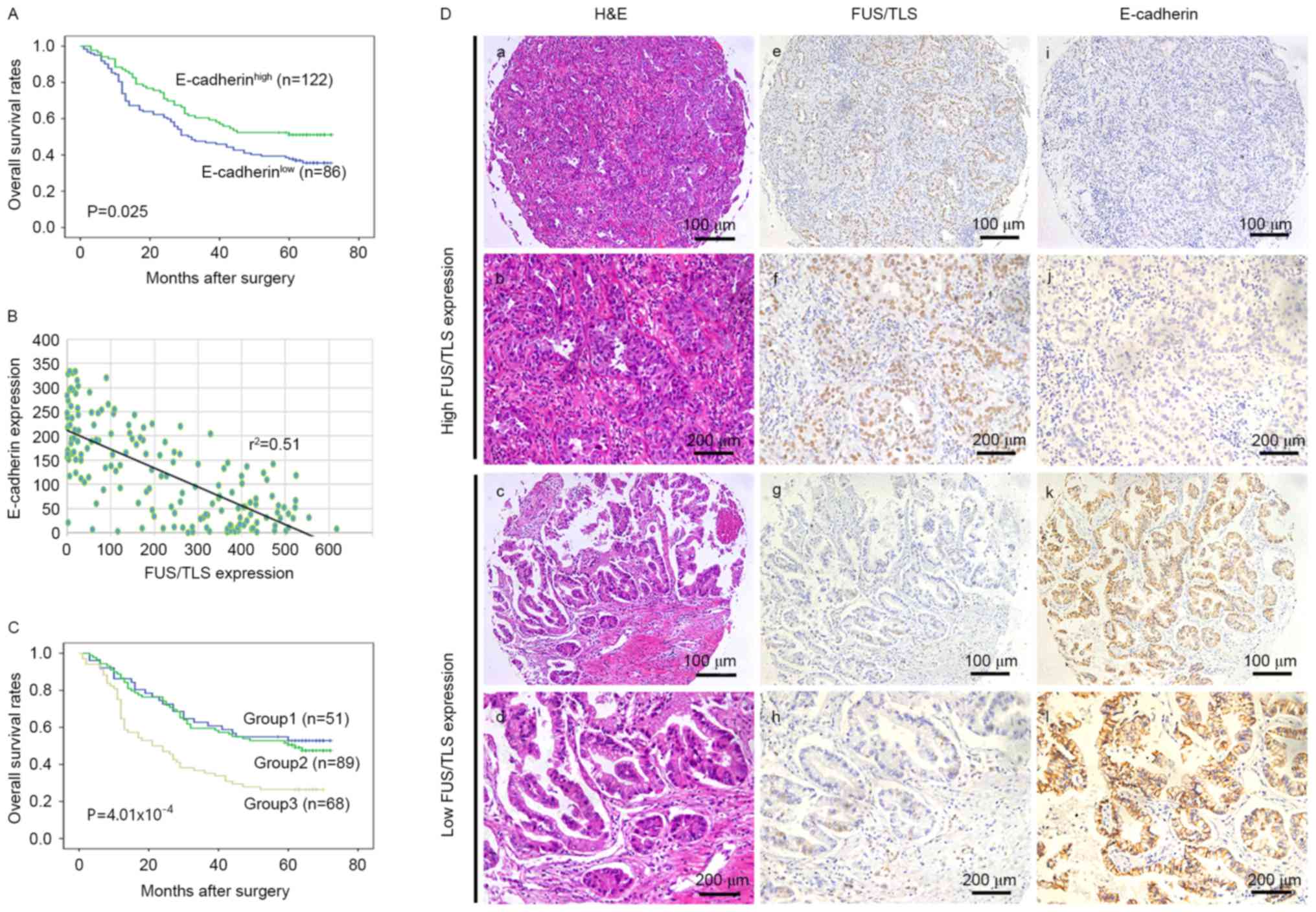|
1
|
Siegel RL, Miller KD and Jemal A: Cancer
statistics, 2016. CA Cancer J Clin. 66:7–30. 2016. View Article : Google Scholar : PubMed/NCBI
|
|
2
|
Ettinger DS, Wood DE, Akerley W, Bazhenova
LA, Borghaei H, Camidge DR, Cheney RT, Chirieac LR, D'Amico TA,
Dilling TJ, et al: NCCN guidelines insights: non-small cell lung
cancer, version 4.2016. J Natl Compr Canc Netw. 14:255–264. 2016.
View Article : Google Scholar : PubMed/NCBI
|
|
3
|
Zappa C and Mousa SA: Non-small cell lung
cancer: Current treatment and future advances. Transl Lung Cancer
Res. 5:288–300. 2016. View Article : Google Scholar : PubMed/NCBI
|
|
4
|
Trautmann M, Menzel J, Bertling C, Cyra M,
Isfort I, Steinestel K, Elges S, Grünewald I, Altvater B, Rossig C,
et al: FUS-DDIT3 fusion protein driven IGF-IR signaling is a
therapeutic target in myxoid liposarcoma. Clin Cancer Res.
23:6227–6238. 2017. View Article : Google Scholar : PubMed/NCBI
|
|
5
|
Morohoshi F, Ootsuka Y, Arai K, Ichikawa
H, Mitani S, Munakata N and Ohki M: Genomic structure of the human
RBP56/hTAFII68 and FUS/TLS genes. Gene. 221:191–198. 1998.
View Article : Google Scholar : PubMed/NCBI
|
|
6
|
Bertolotti A, Bell B and Tora L: The
N-terminal domain of human TAFII68 displays transactivation and
oncogenic properties. Oncogene. 18:8000–8010. 1999. View Article : Google Scholar : PubMed/NCBI
|
|
7
|
Zinszner H, Albalat R and Ron D: A novel
effector domain from the RNA-binding protein TLS or EWS is required
for oncogenic transformation by CHOP. Genes Dev. 8:2513–2526. 1994.
View Article : Google Scholar : PubMed/NCBI
|
|
8
|
Lerga A, Hallier M, Delva L, Orvain C,
Gallais I, Marie J and Moreau-Gachelin F: Identification of an RNA
binding specificity for the potential splicing factor TLS. J Biol
Chem. 276:6807–6816. 2001. View Article : Google Scholar : PubMed/NCBI
|
|
9
|
Nguyen CD, Mansfield RE, Leung W, Vaz PM,
Loughlin FE, Grant RP and Mackay JP: Characterization of a family
of RanBP2-type zinc fingers that can recognize single-stranded RNA.
J Mol Biol. 407:273–283. 2011. View Article : Google Scholar : PubMed/NCBI
|
|
10
|
Ohno T, Ouchida M, Lee L, Gatalica Z, Rao
VN and Reddy ES: The EWS gene, involved in Ewing family of tumors,
malignant melanoma of soft parts and desmoplastic small round cell
tumors, codes for an RNA binding protein with novel regulatory
domains. Oncogene. 9:3087–3097. 1994.PubMed/NCBI
|
|
11
|
Cassiday LA and Maher LJ III: Having it
both ways: Transcription factors that bind DNA and RNA. Nucleic
Acids Res. 30:4118–4126. 2002. View Article : Google Scholar : PubMed/NCBI
|
|
12
|
Panagopoulos I, Aman P, Mertens F, Mandahl
N, Rydholm A, Bauer HF and Mitelman F: Genomic PCR detects tumor
cells in peripheral blood from patients with myxoid liposarcoma.
Genes Chromosomes Cancer. 17:1021996. View Article : Google Scholar : PubMed/NCBI
|
|
13
|
Campos-Melo D, Droppelmann CA, Volkening K
and Strong MJ: RNA-binding proteins as molecular links between
cancer and neurodegeneration. Biogerontology. 15:587–610. 2014.
View Article : Google Scholar : PubMed/NCBI
|
|
14
|
Riggi N, Cironi L, Suva ML and Stamenkovic
I: Sarcomas: Genetics, signalling, and cellular origins. Part 1:
The fellowship of TET. J Pathol. 213:4–20. 2007.
|
|
15
|
Crozat A, Aman P, Mandahl N and Ron D:
Fusion of CHOP to a novel RNA-binding protein in human myxoid
liposarcoma. Nature. 363:640–644. 1993. View Article : Google Scholar : PubMed/NCBI
|
|
16
|
Ichikawa H, Shimizu K, Hayashi Y and Ohki
M: An RNA-binding protein gene, TLS/FUS, is fused to ERG in human
myeloid leukemia with t(16;21) chromosomal translocation. Cancer
Res. 54:2865–2868. 1994.PubMed/NCBI
|
|
17
|
Kong XT, Ida K, Ichikawa H, Shimizu K,
Ohki M, Maseki N, Kaneko Y, Sako M, Kobayashi Y, Tojou A, et al:
Consistent detection of TLS/FUS-ERG chimeric transcripts in acute
myeloid leukemia with t(16;21)(p11;q22) and identification of a
novel transcript. Blood. 90:1192–1199. 1997.PubMed/NCBI
|
|
18
|
Spitzer JI, Ugras S, Runge S, Decarolis P,
Antonescu C, Tuschl T and Singer S: mRNA and protein levels of FUS,
EWSR1, and TAF15 are upregulated in liposarcoma. Genes Chromosomes
Cancer. 50:338–347. 2011. View Article : Google Scholar : PubMed/NCBI
|
|
19
|
Ke H, Zhao L, Feng X, Xu H, Zou L, Yang Q,
Su X, Peng L and Jiao B: NEAT1 is required for survival of breast
cancer cells through FUS and miR-548. Gene Regul Syst Bio.
10:11–17. 2016.PubMed/NCBI
|
|
20
|
Lepourcelet M, Tou L, Cai L, Sawada J,
Lazar AJ, Glickman JN, Williamson JA, Everett AD, Redston M, Fox
EA, et al: Insights into developmental mechanisms and cancers in
the mammalian intestine derived from serial analysis of gene
expression and study of the hepatoma-derived growth factor (HDGF).
Development. 132:415–427. 2005. View Article : Google Scholar : PubMed/NCBI
|
|
21
|
Kalluri R and Weinberg RA: The basics of
epithelial-mesenchymal transition. J Clin Invest. 119:1420–1428.
2009. View
Article : Google Scholar : PubMed/NCBI
|
|
22
|
Bremnes RM, Veve R, Gabrielson E, Hirsch
FR, Baron A, Bemis L, Gemmill RM, Drabkin HA and Franklin WA:
High-throughput tissue microarray analysis used to evaluate biology
and prognostic significance of the E-cadherin pathway in
non-small-cell lung cancer. J Clin Oncol. 20:2417–2428. 2002.
View Article : Google Scholar : PubMed/NCBI
|
|
23
|
Andersson MK, Stahlberg A, Arvidsson Y,
Olofsson A, Semb H, Stenman G, Nilsson O and Aman P: The
multifunctional FUS, EWS and TAF15 proto-oncoproteins show cell
type-specific expression patterns and involvement in cell spreading
and stress response. BMC Cell Biol. 9:372008. View Article : Google Scholar : PubMed/NCBI
|
|
24
|
Hirohashi S: Inactivation of the
E-cadherin-mediated cell adhesion system in human cancers. Am J
Pathol. 153:333–339. 1998. View Article : Google Scholar : PubMed/NCBI
|
|
25
|
Gu J, Ding JY, Lu CL, Lin ZW, Chu YW, Zhao
GY, Guo J and Ge D: Overexpression of CD88 predicts poor prognosis
in non-small-cell lung cancer. Lung Cancer. 81:259–265. 2013.
View Article : Google Scholar : PubMed/NCBI
|
|
26
|
Livak KJ and Schmittgen TD: Analysis of
relative gene expression data using real-time quantitative PCR and
the 2(-Delta Delta C(T)) method. Methods. 25:402–408. 2001.
View Article : Google Scholar : PubMed/NCBI
|
|
27
|
Liao YF, Wu YB, Long X, Zhu SQ, Jin C, Xu
JJ and Ding JY: High level of BRD4 promotes non-small cell lung
cancer progression. Oncotarget. 7:9491–9500. 2016. View Article : Google Scholar : PubMed/NCBI
|
|
28
|
Liao Y, Gu J, Wu Y, Long X, Ge DI, Xu J
and Ding J: Low level of 5-Hydroxymethylcytosine predicts poor
prognosis in non-small cell lung cancer. Oncol Lett. 11:3753–3760.
2016. View Article : Google Scholar : PubMed/NCBI
|
|
29
|
Zhao GY, Ding JY, Lu CL, Lin ZW and Guo J:
The overexpression of 14-3-3ζ and Hsp27 promotes non-small cell
lung cancer progression. Cancer. 120:652–663. 2014. View Article : Google Scholar : PubMed/NCBI
|
|
30
|
Uranishi H, Tetsuka T, Yamashita M,
Asamitsu K, Shimizu M, Itoh M and Okamoto T: Involvement of the
pro-oncoprotein TLS (translocated in liposarcoma) in nuclear
factor-kappa B p65-mediated transcription as a coactivator. J Biol
Chem. 276:13395–13401. 2001. View Article : Google Scholar : PubMed/NCBI
|
|
31
|
Zinszner H, Sok J, Immanuel D, Yin Y and
Ron D: TLS (FUS) binds RNA in vivo and engages in
nucleo-cytoplasmic shuttling. J Cell Sci. 110:1741–1750.
1997.PubMed/NCBI
|
|
32
|
Mastrocola AS, Kim SH, Trinh AT,
Rodenkirch LA and Tibbetts RS: The RNA-binding protein fused in
sarcoma (FUS) functions downstream of poly(ADP-ribose) polymerase
(PARP) in response to DNA damage. J Biol Chem. 288:24731–24741.
2013. View Article : Google Scholar : PubMed/NCBI
|
|
33
|
Ward CL, Boggio KJ, Johnson BN, Boyd JB,
Douthwright S, Shaffer SA, Landers JE, Glicksman MA and Bosco DA: A
loss of FUS/TLS function leads to impaired cellular proliferation.
Cell Death Dis. 5:e15722014. View Article : Google Scholar : PubMed/NCBI
|
|
34
|
Panagopoulos I, Aman P, Fioretos T,
Höglund M, Johansson B, Mandahl N, Heim S, Behrendtz M and Mitelman
F: Fusion of the FUS gene with ERG in acute myeloid leukemia with
t(16;21)(p11;q22). Genes Chromosomes Cancer. 11:256–262. 1994.
View Article : Google Scholar : PubMed/NCBI
|
|
35
|
Haile S, Lal A, Myung JK and Sadar MD:
FUS/TLS is a co-activator of androgen receptor in prostate cancer
cells. PLoS One. 6:e241972011. View Article : Google Scholar : PubMed/NCBI
|

















